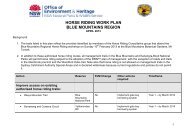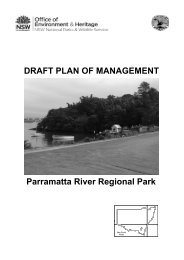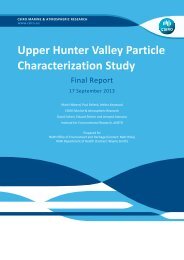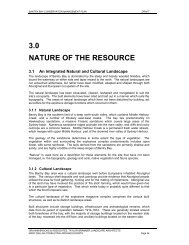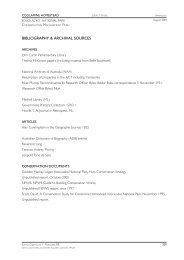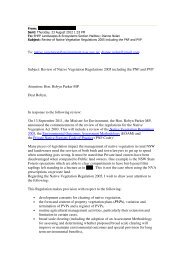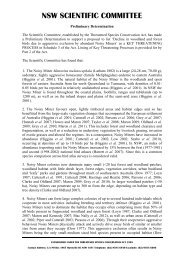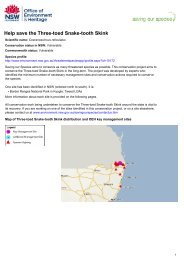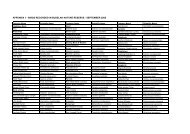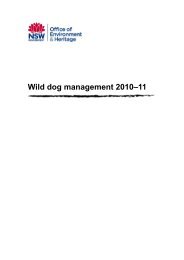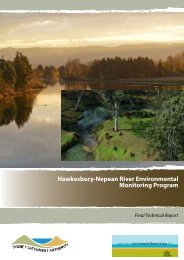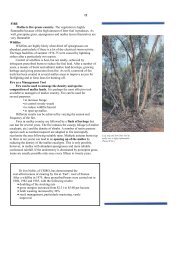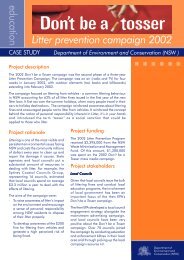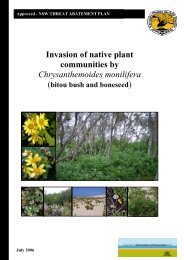The Vertebrate Fauna of Jenolan Karst Conservation Reserve: Final
The Vertebrate Fauna of Jenolan Karst Conservation Reserve: Final
The Vertebrate Fauna of Jenolan Karst Conservation Reserve: Final
You also want an ePaper? Increase the reach of your titles
YUMPU automatically turns print PDFs into web optimized ePapers that Google loves.
6 THREATS TO NATIVE FAUNA<br />
6.1 INTRODUCTION<br />
<strong>The</strong>re are many threats acting on vertebrate fauna at JKCR. Threats tend to belong to one <strong>of</strong> several<br />
broad groupings: introduced species (including introduced diseases); habitat loss and degradation; or<br />
direct interference and mortality. This section identifies all threats impacting or likely to impact on all<br />
priority vertebrate fauna in JKCR. Threats are ranked as to their relative importance in section 6.3.<br />
Management recommendations for ameliorating these threats are delivered in section 7. Cavedwelling<br />
fauna, including threats and management, are dealt with in greater detail in section 9.<br />
6.2 KEY THREATENING PROCESSES<br />
Key Threatening Processes (KTPs) are threats listed under the NSW TSC Act or Commonwealth<br />
EPBC Act as a process that threatens, or could threaten, the survival or evolutionary development <strong>of</strong><br />
species, populations or ecological communities.<br />
For reference all KTPs relevant to JKCR have been listed in Table 9 although not all are important at<br />
the current time. <strong>The</strong> relative priority <strong>of</strong> threats is analysed later in this section.<br />
Table 9 All key threatening processes listed on the NSW TSC Act and/or Commonwealth EPBC Act<br />
identified for JKCR<br />
Threat Act Threat type<br />
Loss and degradation <strong>of</strong> native plant and animal habitat by invasion <strong>of</strong><br />
escaped garden plants, including aquatic plants.<br />
92<br />
EPBC Weed<br />
Invasion and establishment <strong>of</strong> exotic vines and scramblers TSC Weed<br />
Invasion <strong>of</strong> native plant communities by exotic perennial grasses TSC Weed<br />
Competition and grazing by the feral European rabbit TSC/EPBC Pest animal<br />
Competition and habitat degradation by feral goats, Capra hircus<br />
Linnaeus 1758<br />
TSC/EPBC Pest animal<br />
Competition from feral honeybees (Apis mellifera) TSC Pest animal<br />
Herbivory and environmental degradation caused by feral deer TSC Pest animal<br />
Predation and hybridisation by feral dogs, Canis lupus familiaris TSC Pest animal<br />
Predation by feral cats TSC/EPBC Pest animal<br />
Predation by the European red fox TSC/EPBC Pest animal<br />
Predation by the plague minnow (Gambusia holbrooki) TSC Pest animal<br />
Predation, habitat degradation, competition and disease transmission by<br />
feral pigs (Sus scr<strong>of</strong>a)<br />
Alteration to the natural flow regimes <strong>of</strong> rivers, streams, floodplains &<br />
wetlands.<br />
TSC/EPBC Pest animal<br />
TSC Habitat loss/change<br />
Ecological consequences <strong>of</strong> high frequency fires TSC Habitat loss/change<br />
Anthropogenic climate change TSC/EPBC Habitat loss/change<br />
Loss <strong>of</strong> hollow-bearing trees TSC Habitat loss/change<br />
Removal <strong>of</strong> dead wood and dead trees TSC Habitat loss/change<br />
Infection by Psittacine circoviral (beak & feather) disease affecting<br />
endangered psittacine species<br />
Infection <strong>of</strong> frogs by amphibian chytrid causing the disease<br />
chytridiomycosis<br />
TSC/EPBC Disease<br />
TSC/EPBC Disease<br />
Infection <strong>of</strong> native plants by Phytophthora cinnamomi TSC/EPBC Disease<br />
<strong>The</strong> <strong>Vertebrate</strong> <strong>Fauna</strong> <strong>of</strong> <strong>Jenolan</strong> <strong>Karst</strong> <strong>Conservation</strong> <strong>Reserve</strong>



